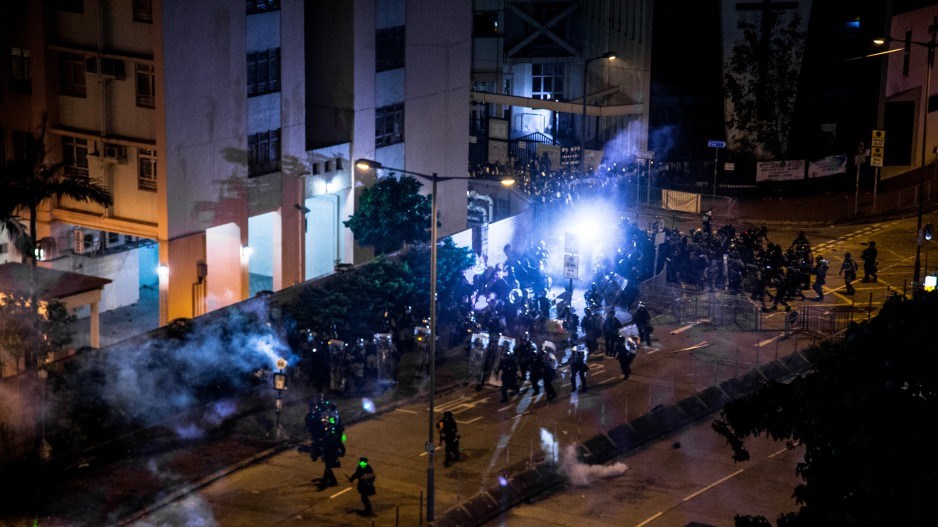Canada needs to act more proactively to provide a safe haven for Hong Kong’s asylum-seekers, Canadian citizens living in the city and businesses looking to flee the Beijing crackdown that is undermining the former British colony’s autonomy.
That’s the message of several Canadian analysts, activists and observers who are expressing grave concerns about Hong Kong. Long viewed as a leading global financial hub, it is now beset by social and economic strife as China looks to stamp out dissent in the city.
The prospect of an exodus from Hong Kong, which is in danger of losing its long-standing role as a western gateway to the Asian economy, will hurt Canada’s economic stakes in Asia, but there may still be silver linings as a result.
“I understand there’s always a burden when you bring in new folks because they need time to settle and to be able to find work,” said Cherie Wong, executive director of activist group Alliance Canada Hong Kong (ACHK). “But this is an investment. It’s not about immediate gains. We aren’t only looking to bring Hong Kongers here for safety temporarily; this is a plan to incorporate Hong Kongers into Canadian society ... and give back to Canada.”
In late June, an ACHK policy brief urged the federal government to ease restrictions on Hong Kong pro-democracy protesters seeking asylum in Canada.
It argued that Ottawa and the provinces should consider housing Hong Kong asylum seekers – many of whom are educated, skilled and trained in professional fields – to fill labour demands in programs such as the Rural and Northern Immigration Pilot and the Provincial Nominee Program and Working Holiday Visa in Canada program.
Wong added that “provinces and municipalities have a major role in the selection of economic immigrants” and the overall concept’s success “will require collaboration with provincial and municipal partners.”
She noted other groups oppressed in the Chinese system – Uighurs, Tibetans and Falun Gong practitioners – should also be considered under the same programs.
Another option B.C. can look at, said former Vancouver councillor and SUCCESS CEO Tung Chan, is the revival of the AdvantageBC International Financial Centre legislation. It was abolished by the current BC NDP provincial government after media reports accused the program under the BC Liberal government of providing a secretive tax-incentive structure to lure foreign companies to set up shop in the city.
While the previous program had its warts, Chan said, something similar may allow B.C. to siphon off some businesses looking to leave Hong Kong and are not dependent on the mainland Chinese market.
“This may encourage the Hong Kong foreign-exchange traders to move their books here to Vancouver – which will not only help repatriate the experts but also create employment.”
As for the 300,000 people holding Canadian citizenship or passports living in Hong Kong, opinions among observers are divided. Ai-men Lau of the Macdonald-Laurier Institute said the situation in Hong Kong has dramatically deteriorated since Beijing implemented the security law last week, where police are now authorized by law to do whatever is necessary to quell disturbances where Chinese authorities see a threat to national interests and stability.
When combined with the ongoing Meng Wanzhou affair, with the detention by Beijing of Canadians Michael Kovrig and Michael Spavor, the threat of China using the national security law to justify arrests of Canadian citizens in Hong Kong is far too great for Ottawa to ignore, Lau said.
“Repatriating the Canadians in Hong Kong is something that Ottawa should consider,” she said. “Hong Kong is facing an uncertain future, and we cannot guarantee their safety. Canada has sent out an advisory telling people they may be arbitrarily detained; that, to me, means we should be taking further steps.… I just don’t think it’s a safe place anymore.
“Until China fully confirms it can ensure [Canadian citizens’] security and safety – which I don’t think they can, because they’ve already proven with the ‘Two Michaels’ situation that they are willing to detain our citizens for political means – I think we need to repatriate our Canadians in Hong Kong.”
Chan said that may not be realistic, however, noting that Canadians living in Hong Kong may have jobs, family and other long-term ties to the city that will keep them rooted there as long as they deem possible.
“I don’t think they all want to come back.”
Chan added that the best Canada can do is to have a repatriation plan ready if the situation deteriorates further.
“The other option is to create ‘overseas Canadian consul’ positions in Hong Kong – much like the Overseas Chinese Consul [OCC] positions in the Chinese consulates in Canada. The OCC in Hong Kong will be tasked to actively liaise with Canadians living there and ensure the Canadian government is kept up to date with the needs of our expatriates.”
Earlier in July, Prime Minister Justin Trudeau announced that Ottawa had suspended its extradition treaty with Hong Kong given the current events and prohibited exports of sensitive goods such as military products.




